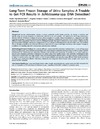Please use this identifier to cite or link to this item:
https://accedacris.ulpgc.es/jspui/handle/10553/54662
| Title: | Long-term frozen storage of urine samples: a trouble to get PCR results in Schistosoma spp. DNA Detection? | Authors: | Fernández-Soto, Pedro Velasco Tirado, Virginia Carranza Rodríguez, Cristina Pérez-Arellano, José Luis Muro, Antonio |
UNESCO Clasification: | 3201 Ciencias clínicas | Keywords: | Polymerase-Chain-Reaction Haematobium Infection Mansoni Diagnosis Amplification, et al |
Issue Date: | 2013 | Journal: | PLoS ONE | Abstract: | Background Human schistosomiasis remains a serious worldwide public health problem. At present, a sensitive and specific assay for routine diagnosis of schistosome infection is not yet available. The potential for detecting schistosome-derived DNA by PCR-based methods in human clinical samples is currently being investigated as a diagnostic tool with potential application in routine schistosomiasis diagnosis. Collection of diagnostic samples such as stool or blood is usually difficult in some populations. However, urine is a biological sample that can be collected in a non-invasive method, easy to get from people of all ages and easy in management, but as a sample for PCR diagnosis is still not widely used. This could be due to the high variability in the reported efficiency of detection as a result of the high variation in urine samples’ storage or conditions for handling and DNA preservation and extraction methods. Methodology/Principal Findings We evaluate different commercial DNA extraction methods from a series of long-term frozen storage human urine samples from patients with parasitological confirmed schistosomiasis in order to assess the PCR effectiveness for Schistosoma spp. detection. Patientś urine samples were frozen for 18 months up to 7 years until use. Results were compared with those obtained in PCR assays using fresh healthy human urine artificially contaminated with Schistosoma mansoni DNA and urine samples from mice experimentally infected with S. mansoni cercariae stored frozen for at least 12 months before use. PCR results in fresh human artificial urine samples using different DNA based extraction methods were much more effective than those obtained when long-term frozen human urine samples were used as the source of DNA template. Conclusions/Significance Long-term frozen human urine samples are probably not a good source for DNA extraction for use as a template in PCR detection of Schistosoma spp., regardless of the DNA method of extraction used. | URI: | https://accedacris.ulpgc.es/handle/10553/54662 | ISSN: | 1932-6203 | DOI: | 10.1371/journal.pone.0061703 | Source: | PLoS ONE [ISSN 1932-6203], v. 8 (4), e61703 |
| Appears in Collections: | Artículos |
SCOPUSTM
Citations
14
checked on Jun 8, 2025
WEB OF SCIENCETM
Citations
12
checked on Jan 25, 2026
Page view(s)
68
checked on Jan 10, 2026
Download(s)
76
checked on Jan 10, 2026
Google ScholarTM
Check
Altmetric
Share
Export metadata
Items in accedaCRIS are protected by copyright, with all rights reserved, unless otherwise indicated.
